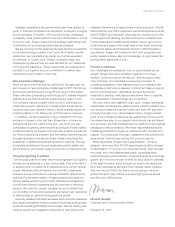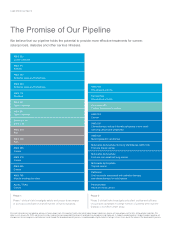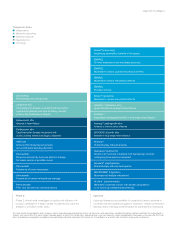Amgen 2006 Annual Report Download - page 13
Download and view the complete annual report
Please find page 13 of the 2006 Amgen annual report below. You can navigate through the pages in the report by either clicking on the pages listed below, or by using the keyword search tool below to find specific information within the annual report.Amgen 2006 Annual Report 11
With Vectibix™
, we fulfill a promise
to bring targeted therapeutics to
cancer patients.
A milestone for Amgen —and for patient care
With U.S. approval of Vectibix™ (panitumumab) in September
2006, Amgen’s oncology business began an important new
chapter. The company has long been a leader in supportive
care therapies —that is, medicines that may reduce certain
complications from chemotherapy. Vectibix™, approved for use
in patients with metastatic colorectal cancer whose disease has
progressed after all standard chemotherapy regimens, is a
targeted agent and Amgen’s first oncology therapeutic—the
company’s first therapy used to combat cancer itself.
The Vectibix™ journey: from Abgenix to Immunex to Amgen
Vectibix™ was discovered by scientists at Abgenix, Inc., a
company with expertise in the discovery and development of
monoclonal antibodies (MAbs). In 2000, Abgenix entered into
a partnership with Immunex Corporation to jointly develop
ABX-EGF, the molecule that would become Vectibix™
.
Two years later, Amgen acquired Immunex and inherited the
Abgenix partnership. Things came full circle in 2006 as
Amgen completed its acquisition of Abgenix and took full
ownership of panitumumab. With the acquisition also came a
100,000-square-foot plant in Fremont, California, specializing
in MAb production. Since the approval of Vectibix™, the plant
has been devoted almost exclusively to manufacturing the bulk
form of the product.
“Integrating Abgenix into Amgen was a key component in
successfully delivering Vectibix™ to patients,” says Dennis Fenton,
executive vice president, Operations. “Nearly 90 percent of
the Amgen Fremont staff are Abgenix people who stayed on.
They’ve been committed to this product for years, so it’s exciting
to everyone to see it on the market.”
The science of Vectibix™
Vectibix™ acts on a cellular signaling pathway that is dependent
upon molecules called ligands binding to epidermal growth factor
receptor, or EGFr. Stimulation of this pathway helps regulate the
growth of many different cells in the body, but when the pathway
is altered, its behavior changes and it can also cause cancer
cells to grow. In fact, many cancer cells appear to require
EGFr-dependent signaling pathways to keep them alive and
proliferating. Vectibix™ works by attaching to EGFr, effectively
turning off the pathway.
Vectibix™ is the first and only fully human anti-EGFr monoclonal
antibody approved by the FDA.
Hope for more time
Ongoing and planned global trials will evaluate the potential of
panitumumab in earlier lines of treatment for metastatic colorectal
cancer; in other tumor types, such as head and neck cancer;
and in combination with other targeted therapies. Right now, it
is an important treatment option for patients whose disease has
progressed after the standard treatment options have failed.
Data show that for some patients, Vectibix™ may offer more time
without disease progression.
Says Cynthia Schwalm, vice president, Amgen Oncology,
“When you talk to these patients, you are reminded how much
even one more day means to them.”
























